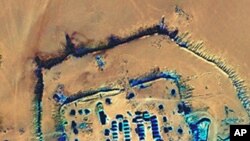The international watchdog group Global Witness has obtained satellite pictures suggesting an area in the far north of Darfur, Sudan is being explored for oil. The group says an oil discovery could help peace efforts in the region if any revenues were distributed fairly.
Global Witness released images revealing a grid-like pattern of straight lines, characteristic of an oil exploration site, stretching 500 kilometers across Darfur's desert northwest.
A second set appears to show an oil exploration camp complete with accommodation huts, four-wheel-drive vehicles, and a large storage depot.
Several firms have oil concessions in Darfur, and the area mentioned by Global Witness is the Great Sahara Petroleum Operating Company, a consortium of Saudi, Yemeni, Sudanese and Jordanian firms.
Global Witness Campaigner Mike Davis says that if oil is discovered and the proceeds distributed in an equitable way, it could encourage the conflicting parties towards peace.
"There is a precedent, a very positive one in Sudan, for using wealth-sharing agreements over oil as a means of cementing a peace deal, as in the 2005 CPA between north and south Sudan," said Mike Davis. "We're not saying that you could use that as a precise template here, but in that deal you had a clear way of allocating oil revenues between central government, local government and local parties."
Sudan's central government is preparing to re-enter peace talks with Darfur rebels in Qatar next week. The region has been gripped by civil war since 2003, when rebel groups took up arms against the Khartoum government.
The United Nations says the fighting has killed up to 300,000 people and displaced some 2.7 million more. The conflict led to the indictment of Sudanese President Omar al-Bashir on war crime charges by the International Criminal Court.
Global Witness says if oil is discovered in Darfur, it could provide an opportunity for greater economic development, but Mike Davis says there is no way extraction could begin without a peace that would enable it to occur.
"Were oil to be discovered, it could actually prod the conflicting parties to come to some kind of agreement so that there would then be a basis for exploiting it and, we would argue, necessarily sharing it in an equitable way," he said.
The distribution of oil revenues between north and south Sudan was one of the principle factors in the 2005 Comprehensive Peace Agreement that ended the war between the two regions.
Global Witness says more than $7 billion of oil money has since been transferred from Khartoum in the north to the southern capital Juba.
Sudan produces 500,000 barrels of oil per day, with about 400,000 barrels exported, mostly to China. Oil reserves are estimated at five billion barrels.
Watchdog Group Says Evidence Uncovered Of Oil Exploration In Darfur




